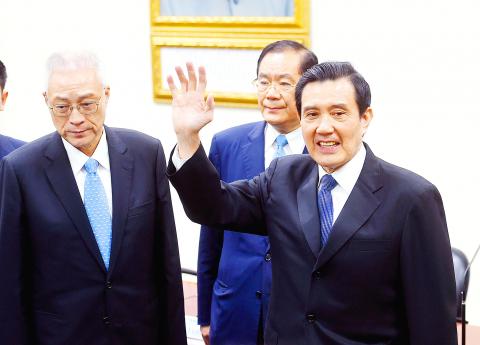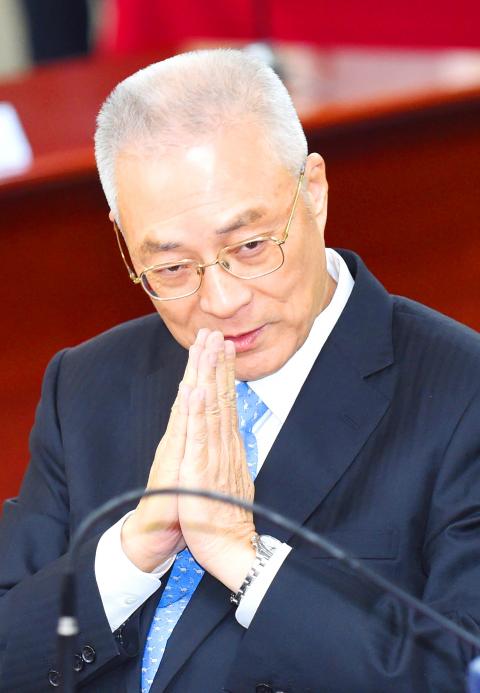President Ma Ying-jeou (馬英九) resigned as Chinese National Party (KMT) chairman yesterday at a meeting of the party’s Central Standing Committee, following the KMT’s unprecedented loss in the nine-in-one elections on Saturday.
Vice President Wu Den-yih (吳敦義), who is one of the KMT’s seven vice chairpeople, became the party’s acting chairman until one is elected.
After naming Wu acting chairman, the committee made vice chairperson Hung Hsiu-chu (洪秀柱), who is also legislative deputy speaker, secretary-general of the KMT.

Photo: Fang Pin-chao, Taipei Times
The KMT shakeup comes four days after voters dealt the ruling party a resounding defeat on Saturday, a fact Ma addressed in his resignation speech:
“First of all, I want to thank all the voters for their performance in these democratic elections. Every ballot represents the love that citizens have for Taiwan, and the poll results have reminded us that those in power must also be humble listeners,” he told the meeting.
“The KMT met unprecedented defeat in these elections. As party chairman, I have to apologize to all the supporters that I have disappointed,” he said. “To take responsibility for this, I am here to announce my resignation as KMT chairman.”

Photo: Liu Hsin-de, Taipei Times
Ma bowed deeply in apology for more than 10 seconds and said that the election results show that “our [the KMT’s] reforms have not occurred fast enough to meet the public’s expectations.”
Including yesterday’s meeting, Ma has now apologized three times for the party’s thrashing. Ma apologized for the KMT’s defeat on the day of the elections, but did not announce that he would be stepping down as chairman. Premier Jiang Yi-huah (江宜樺) and KMT Secretary-General Tseng Yung-chuan (曾永權), on the other hand, did announce their respective resignations on that day in response to the party’s showing.
However, the next day, it was reported that Ma would resign at the meeting that the committee holds every Wednesday.
At the party’s regular closed-door meeting on Tuesday, Ma apologized again and said that the public’s expectations have outpaced the KMT’s reforms, according to a press release.
He also said that while the party had lost this time, “we firmly believe that the country’s overall approach has not been a failure, nor has the direction liberalization reform has taken.”
Former KMT legislator Chang Sho-wen (張碩文), who was part of defeated KMT Taipei mayoral candidate Sean Lien’s (連勝文) campaign team, lashed out at Ma’s “reluctant resignation,” saying it was tendered “at the wrong time and with the wrong attitude.”
Chang said that Ma should have accompanied his announcement with an acknowledgement of his “false leadership,” but had instead insisted that the direction his reforms took was the correct one.
Chang also questioned why an outgoing chairman had the right to appoint the party’s acting chairman and secretary-general.
“Real reform would be to respect the institution [the party] and return power to the Central Standing Committee — the most powerful body within the party — instead of pulling strings behind the scenes,” Chang said, seeming to imply that the committee’s appointments for both roles had been made in accordance with Ma’s wishes.

SECURITY: As China is ‘reshaping’ Hong Kong’s population, Taiwan must raise the eligibility threshold for applications from Hong Kongers, Chiu Chui-cheng said When Hong Kong and Macau citizens apply for residency in Taiwan, it would be under a new category that includes a “national security observation period,” Mainland Affairs Council (MAC) Minister Chiu Chui-cheng (邱垂正) said yesterday. President William Lai (賴清德) on March 13 announced 17 strategies to counter China’s aggression toward Taiwan, including incorporating national security considerations into the review process for residency applications from Hong Kong and Macau citizens. The situation in Hong Kong is constantly changing, Chiu said to media yesterday on the sidelines of the Taipei Technology Run hosted by the Taipei Neihu Technology Park Development Association. With

A US Marine Corps regiment equipped with Naval Strike Missiles (NSM) is set to participate in the upcoming Balikatan 25 exercise in the Luzon Strait, marking the system’s first-ever deployment in the Philippines. US and Philippine officials have separately confirmed that the Navy Marine Expeditionary Ship Interdiction System (NMESIS) — the mobile launch platform for the Naval Strike Missile — would take part in the joint exercise. The missiles are being deployed to “a strategic first island chain chokepoint” in the waters between Taiwan proper and the Philippines, US-based Naval News reported. “The Luzon Strait and Bashi Channel represent a critical access

‘FORM OF PROTEST’: The German Institute Taipei said it was ‘shocked’ to see Nazi symbolism used in connection with political aims as it condemned the incident Sung Chien-liang (宋建樑), who led efforts to recall Democratic Progressive Party (DPP) Legislator Lee Kun-cheng (李坤城), was released on bail of NT$80,000 yesterday amid an outcry over a Nazi armband he wore to questioning the night before. Sung arrived at the New Taipei City District Prosecutors’ Office for questioning in a recall petition forgery case on Tuesday night wearing a red armband bearing a swastika, carrying a copy of Adolf Hitler’s Mein Kampf and giving a Nazi salute. Sung left the building at 1:15am without the armband and apparently covering the book with a coat. This is a serious international scandal and Chinese

COUNTERINTELLIGENCE TRAINING: The ministry said 87.5 percent of the apprehended Chinese agents were reported by service members they tried to lure into becoming spies Taiwanese organized crime, illegal money lenders, temples and civic groups are complicit in Beijing’s infiltration of the armed forces, the Ministry of National Defense (MND) said in a report yesterday. Retired service members who had been turned to Beijing’s cause mainly relied on those channels to infiltrate the Taiwanese military, according to the report to be submitted to lawmakers ahead of tomorrow’s hearing on Chinese espionage in the military. Chinese intelligence typically used blackmail, Internet-based communications, bribery or debts to loan sharks to leverage active service personnel to do its bidding, it said. China’s main goals are to collect intelligence, and develop a